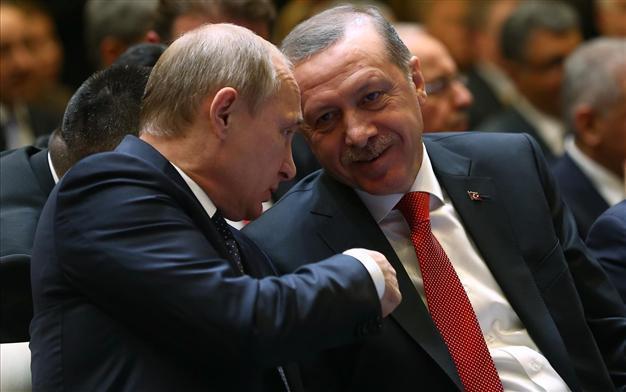Russia knows genocide well, Turkey fires back

Turkish President Recep Tayyip Erdoğan and Russian President Vladimir Putin speak during the latter's visit to Ankara, Dec. 1, 2014. AA Photo
Turkey said on April 24 that it rejected and condemned Russian President Vladimir Putin calling the 1915 mass killings of Ottoman Armenians a "genocide.""Taking into account the mass atrocities and exiles in Caucasus, in the Central Asia and Eastern Europe committed by Russia for a century; collective punishment methods such as Holodomor as well as inhumane practices especially against Turkish and Muslim people in Russia’s own history, we consider that Russia is best-suited to know what exactly “genocide” and its legal dimension are," a foreign ministry statement said.
Turkey also condemned Duma's April 24 resolution that described the 1915 events as "genocide."
"The only thing that Russia can do in this issue is to leave its biased attitude aside and encourage Armenia and the Armenians to respond positively to the calls of Turkey for peace and friendship," the statement added.
Turkey denies that the killings, at a time when Turkish troops were fighting Russian forces during World War I, constituted genocide. It has said there was no organized campaign to wipe out Armenians and no evidence of any such orders from Ottoman authorities.
Turkey’s ambassador to the Vatican was summoned to Ankara for consultations on April 12, hours after Pope Francis called the 1915 incidents involving Armenians “genocide.”
Austria was subjected to a similar reaction by Ankara, as Turkey recalled its ambassador in Vienna on April 22 after parties represented in the Austrian parliament signed a declaration recognizing the massacre of Armenians a century ago as “genocide.”
However, Turkey initially avoided any harsh reaction toward Putin and French President François Hollande, after they described the killings as “genocide" during the commemoration ceremony in Yerevan.
Turkish Energy Minister Taner Yıldız told journalists during a reception in Ankara on April 23 that he was surprised by Putin’s remarks, but the statement “will not affect the ongoing negotiations for joint projects” with Russia, including natural gas trade.
‘Required initiatives will be taken’
Just hours before the ceremony marking the centennial anniversary, Turkish Prime Minister Ahmet Davutoğlu said the required initiatives would be taken concerning Russia.
“Today [April 23], we spoke with our Foreign Minister [Mevlüt Çavuşoğlu] about Russia. The required initiatives will be taken,” Davutoğlu told reporters late on April 23, when asked to comment on a statement delivered by Putin earlier on April 23 in which the Russian president referred to the killings as “genocide.”
“Russia’s and France’s presence in Yerevan casts shadow over the impartiality of the Minsk Group as well. Necessary diplomatic initiatives are being taken about them too,” Davutoğlu added, without elaboration, referring to the presence of both Putin and Hollande at the ceremony in Yerevan.
“What matters is a clear explanation of our stance to the world,” the prime minister said.
Along with the United States, France and Russia are co-chairs of the Organization for Security and Co-operation in Europe’s (OSCE) Minsk Group, which has been working since 1992 to mediate the Nagorno-Karabakh dispute between Armenia and Azerbaijan.
















